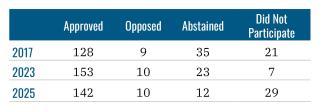- Policy Analysis
- Policy Alert
A Snapshot of Israel’s Deepening Diplomatic Isolation: Comparing Key UNGA Votes, 2017-2025
The voting patterns highlight Israel’s worsening international isolation, with even some of its longtime defenders leaving the fold.
Last week was one of the worst for Israeli diplomacy in recent memory:
- On Tuesday, a military strike against Hamas leaders in Doha prompted explicit condemnation from President Trump.
- On Thursday, the UN Security Council issued a statement supporting Qatar and condemning the strike, with unanimous member support—a rarity since Russia’s invasion of Ukraine. Washington shielded Israel from specific mention in the statement, but the message of collective outrage was clear.
- On Friday, 142 of 164 countries voting in the UN General Assembly endorsed a French and Saudi plan for Palestinian statehood over Israeli (and U.S.) objections.
While many observers are naturally focusing on the Qatar incident, its impact on the Gaza war, and its implications for Gulf reliance on U.S. security guarantees, the UNGA vote to endorse the “New York Declaration” on a two-state solution is quite significant as well. This is not because the declaration is relevant to actual Israeli-Palestinian peacemaking—indeed, like many UNGA resolutions, the document will soon be forgotten because its call for statehood based on a reformed Palestinian Authority is wholly disconnected from current political realities on both sides. Rather, the tally of votes (and abstentions) highlights Israel’s worsening isolation, with even some of its longtime defenders leaving the fold.
This sobering trend becomes clearer when one looks back at votes on three lopsided UNGA resolutions related to Israeli-Palestinian affairs: a December 2017 vote implicitly chastising the first Trump administration for moving the U.S. embassy to Jerusalem, labeling the decision “null and void,” and urging other countries not to relocate their own embassies there; a December 2023 vote during the Biden administration calling for an immediate humanitarian ceasefire in Gaza; and last week’s vote to endorse the creation of an independent Palestinian state in the middle of an ongoing war. The final vote tallies were as follows:
A closer look reveals several fascinating aspects to these votes:
- The “oppose” group seems consistent but is surprisingly fluid, with 14 different countries voting “no” at one point or another. In addition to the United States and Israel, only 2 countries opposed all three resolutions: Micronesia and Nauru.
- The declining number of abstentions is a worrisome trend for Jerusalem, since formally abstaining from UNGA votes is generally acknowledged as passive support for Israel. Only three countries opposed or abstained on all three votes: Guatemala, which opposed the 2017 and 2023 resolutions and abstained last week, and Cameroon and South Sudan, which abstained from all three votes. In most cases, however, countries that abstained in 2017 and 2023 approved the latest resolution.
- The decline in abstentions is especially serious among Western-oriented countries, particularly in the European Union. In 2017, 8 EU member and candidate states abstained; in 2023, 11 of them abstained and 2 opposed (Austria and the Czech Republic). Last week, however, only 2 such countries abstained (the Czech Republic and Moldova) and one opposed (Hungary). Viewed another way, over the course of three votes spanning less than a decade, Israel has seemingly lost the passive support of 15 Western-oriented countries that abstained on previous resolutions: Australia, Bulgaria, Canada, Croatia, Georgia, Germany, Italy, Latvia, Lithuania, the Netherlands, Poland, Romania, Slovakia, Ukraine, and the United Kingdom. Domestic political changes in some of these countries no doubt had an important impact on their voting behavior.
- The numbers also reveal an interesting split in Europe: among the 27 EU countries and the UK, exactly half abstained from or opposed at least one of these resolutions, while the other half supported all three. The list of countries that voted contrary to the U.S.-Israeli stance on all these resolutions includes Belgium, Cyprus, Denmark, Estonia, Finland, France, Greece, Ireland, Luxembourg, Malta, Portugal, Slovenia, Spain, and Sweden.
- Six countries that are on record as recognizing an independent Palestinian state did not participate in last week’s statehood resolution vote: Iran, Iraq, Madagascar, Tunisia, Venezuela, and Zambia. Of course, countries have all sorts of reasons for deciding not to participate in UNGA votes, so one should not read too much into fluctuations within this category. For example, only one country—Sao Tome and Principe—did not participate in any of the three votes. And at least some of last week’s non-participants were likely reacting to the resolution’s condemnation of Hamas and implied recognition of Israel.
Ultimately, the importance of such UNGA votes is limited—they are nonbinding and often performative, masking pragmatic relationships that may run counter to a country’s voting behavior in the public eye. Indeed, Israel has close ties with some countries that supported all three of the above resolutions.
Even so, voting trends can be useful indicators of underlying political dynamics. And for Israel, whose prime minister just acknowledged the country’s worsening economic isolation, the trends provide one more piece of troubling data about its growing diplomatic isolation—a pattern that runs counter to the aspirations triggered by the Abraham Accords, five years old today. If the end of the Israel-Hamas war is followed by the establishment of an agreed post-conflict administration for Gaza, an opportunity may emerge for Jerusalem—working with some of its estranged friends—to repair this negative trend.
Robert Satloff is The Washington Institute’s Segal Executive Director and Howard P. Berkowitz Chair in U.S. Middle East Policy.




